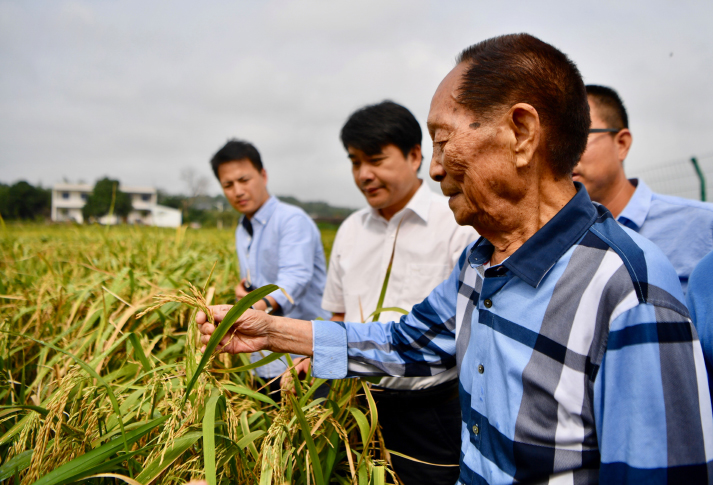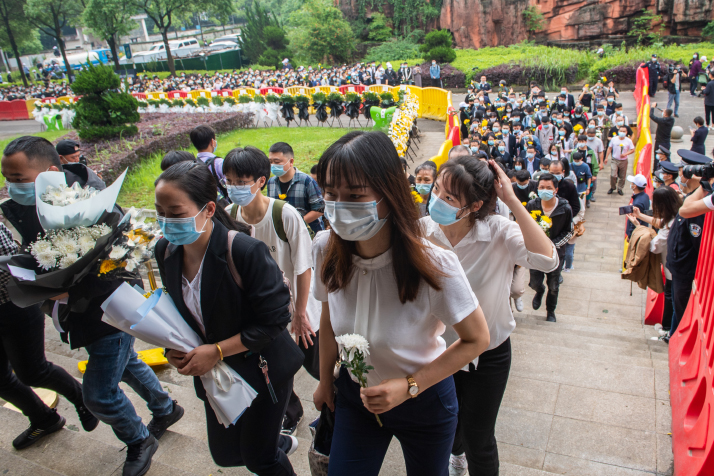| China |
| People mourn Yuan Longping, the father of hybrid rice | |
|
|
 Yuan Longping checks on the growth of hybrid rice in a test field in Xiangtan, Hunan Province, on September 29, 2017 (XINHUA)
When the hearse left Xiangya Hospital in Changsha, Hunan Province, on May 22, it was the setting of an unusual scene. A large crowd stood outside the hospital to say farewell to the man in it and they began to cry out, "Grandpa Yuan, rest in peace!" Yuan Longping, known as the father of hybrid rice in China, died of organ failure on May 22 at the age of 91. But the legacy he left behind will continue to improve food security and research around the world and inspire generations of agro-scientists. His research helped feed 1.4 billion Chinese, nearly one fifth of the world's population, by growing high-yield hybrid rice though China has less than 9 percent of the arable land in the world. When a memorial service was held in Changsha two days later, thousands of people thronged the funeral home, many of whom had come from other parts of China, laying flowers or sheaves of rice, along with messages of grief and admiration, and pictures they had drawn for him. Thousands more attended the online memorial, lighting candles virtually and paying tribute in different ways. On social media, people posted images of their empty plates, writing they would miss Yuan when they ate and promising not to waste rice and other food. "I had never seen so many people come spontaneously to mourn someone," a worker at the funeral home told China News Service.  People pay their last respects to Yuan Longping at the Mingyangshan Funeral Parlor in Changsha, Hunan Province, on May 24 (XINHUA)
International organizations, scientists and the media all expressed their sorrow and admiration. "Today, we mourn the passing of a true food hero," the UN Department of Economic and Social Affairs tweeted on May 22. "Chinese scientist Yuan Longping saved millions of people from hunger by developing the first hybrid rice strains. He passed away today at 91, but his legacy and his mission to end hunger lives on." Qu Dongyu, Director General of the UN Food and Agriculture Organization, said in a tweet, "Deeply saddened by the death of Professor Yuan Longping, my dear master (sic). He devoted his life to the research of hybrid rice, helping billions achieve food security. You were my inspiration. May you rest in peace." The trigger Yuan's work was inspired by the scenes of starvation and death he witnessed as a youngster when China was yet to be food-sufficient. "I saw heartbreaking scenes of people starving to death in the streets during the famine," Yuan once remarked, saying this was the main reason he decided to research on hybrid rice. He graduated from Southwest Agricultural College (now Southwest University) and first taught at a local agriculture school in Hunan. His pioneering research on hybrid rice started in 1964. At that time, most scientists around the world thought that a sustainable way of crossbreeding different strains of rice to produce high-yield varieties was a mission impossible. However, Yuan proved them wrong. After nine years of painstaking research and tests, his team successfully cultivated the world's first high-yield hybrid rice strain in 1973. Over the next few decades, he continued to research and upgrade hybrid rice varieties. According to Xinhua News Agency, in China, where rice is the staple food for the majority of the population, annual hybrid rice plantation has crossed 16 million hectares, 57 percent of the total rice planting area, helping feed an extra 80 million people a year. Even in his octogenarian years, Yuan kept working to make his dreams come true. His two famous dreams were to be able to "enjoy the cool shade under rice stalks taller than human," and to see hybrid rice grown all over the world to address global food scarcity. His work was recognized with awards at home and abroad. He received the State Preeminent Science and Technology Award, China's top science prize, in 2001, and the Medal of the Republic, the country's highest order of honor, in 2019. His other major honors included the Magsaysay Award, Asia's Nobel Prize, in 2001, the World Food Prize in 2004, and the Strait of Magellan Award conferred by the Chilean Government last year. In recent years, he was focusing on research on salt-resistant rice. In January, his team said they planned to grow the rice on nearly 7 million hectares of saline-alkali land, where farming had previously been impossible, over the next eight to 10 years. This year, he was working in the tropical island province of Hainan on a pilot project to further improve rice production. He had an accidental fall and was taken to hospital in March. Every day, he insisted on being told about the latest progress in the work until he was sent to Changsha for further treatment. Yuan and his team worked with dozens of countries around the world to address food insecurity and malnutrition, and his rice research helped feed the world. Today, hybrid rice is grown on more than 8 million hectares of land outside China, including in the United States, Brazil and India, according to the China National Hybrid Rice Research and Development Center. Yuan's work inspired younger generations. Li Linfeng, a Ph.D student at China Agricultural University, told Beijing Review, "Yuan pursued his dreams throughout his life and is a role model for us. We, the younger generation, should take up his baton and imbibe his spirit to further develop our agriculture." Yuan credited his mother Hua Jing, who was an English teacher, with ensuring that he received a modern education and giving him the courage and willpower needed for his grueling research. Even when she was in her 70s, Hua went to the remote village where he was working to look after his children and support his agricultural career. When she passed away, Yuan was attending a meeting on hybrid rice in another city and for years, he carried with him a sense of guilt about not being able to take good care of his mother. When he was 80, he wrote a letter to her, saying, "I owe you a lot. The rice is ripe, mom, and I'm coming to see you." (Print Edition Title: The Man Who Fed The World) Copyedited by Sudeshna Sarkar Comments to taoxing@bjreview.com |
|
||||||||||||||||||||||||||||
|